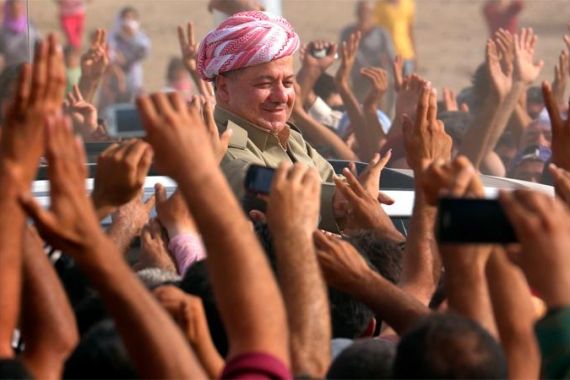Kurdish bond carries Syrian refugee burden
As thousands of Syrian refugees arrive at the camps in Northern Iraq, ‘brotherly Kurdish bond’ still seems strong.

It’s the battered suitcases and the plastic carrier bags that really get to you.
The Kurdish-Syrian refugees cling on to them dearly. Small children lie on top of the bigger suitcases, lying still in unforgiving sun. Small pieces of cloth have been tied to the handles so people can recognise what’s theirs.
But it’s really the way they hold onto them that gets to you. They clutch the handles tightly, hold the carrier bags like babies, held close to the chest. It’s as if letting go of them would somehow mean that their last remaining possessions, the last reminders of the life they just left behind, would simply disappear.
As they arrive at the camp, they trudge miserably towards the registration office. The dust kicks up behind them, coating each person in yellowy hue that makes their faces looked even more battered, even more exhausted.
But even here dignity can be found, of sorts. Teenage men try their hardest to shake off the dust from the clothes they wear and readjust themselves so they look less like, well, refugees. Young girls sit around trying to comb the filth out of knotted and matted hair. By no means rich before they came here but at least at home they had bathrooms and bedrooms, soaps and scents. Now they just struggle to grasp a little bit of dignity, a little bit of self-respect.
The refugee camp I’m in is called Kawergost. It’s the largest in Northern Iraq and houses 13,000 people.
The Kurdish regional government opened the border after it heard stories of executions and beheadings by a group linked to al-Qaeda.
They sent a team to investigate the stories and then opened the border.
They didn’t make the findings of the investigations public and when asked about the investigation team, one Kurdish official I spoke to refused to comment.
Iraqi Kurds and Syrian Kurds share a common history stretching back centuries, they share a common language. The dream of a united Kurdistan includes parts of Syria, Turkey, Iran and Iraq. But Iraqi Kurds have a state of sorts. Officially it’s part of Iraq, but it runs much more like another country. At the checkpoints leading to Iraqi-Kurdistan, Iraqi Arabs are required to register, and it feels like a border crossing. The regional flag flies heavily everywhere and Kurdish is spoken far more widely than Arabic.
For those reasons the Kurdistan regional government opened the border. For many of the Syrians coming over there’s a sense of relief that they have kindred spirits in their Iraqi counterparts who are willing to host them.
And the Iraqi Kurds host them in huge number. In total there are 191,000 refugees here. 39,000 have arrived since Thursday according to the UN Refugee Agency, UNHCR.
Some have found jobs in the oil-rich boom town that is Erbil. The Iraqi Kurds seem to have welcomed them and local charities have collection points on the streets where Iraqi Kurds seem to be donating generously.
The bond of Kurdistan it seems is still strong.
But how long will this brotherly Kurdish bond last? I ask an Iraqi Kurdish friend of mine over coffee.
His answer surprised me. “We want it to last as long as they need us. We want never to be a division between Kurds. But I don’t know if that’s true. There’s a lot of homeless and desperate people in those camps. Sure they are happy right know, but if they are still here in a year what then? Riots? Will they resort to desperate criminal acts to get money? And can you blame them if they did? If things go sour that brotherly Kurdish bond will be sorely tested”.
For the moment things are in preparation and registration mode in the camps. But Syria’s bloody war grinds on with no end in sight. These people could be living in tents for years. Dealing with that long term needs careful thought, diplomacy and massive effort.
Right now the “brotherly Kurdish bond” is carrying this burden. One can only hope that shoulders of Iraqi Kurds are strong enough for the long haul and that Syria finds peace at some point.